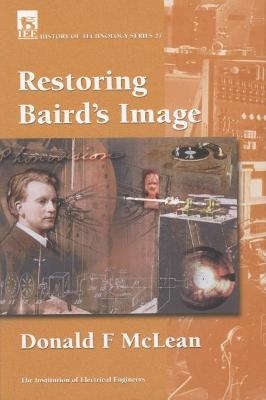
Restoring Baird's Image
Seiten
2000
Institution of Engineering and Technology (Verlag)
978-0-85296-795-9 (ISBN)
Institution of Engineering and Technology (Verlag)
978-0-85296-795-9 (ISBN)
In the late 1920s, John Logie Baird - considered to be the inventor of television - was experimenting with 'phonovision' in which he attempted to record television signals onto gramophone discs. This unique book sheds new light on the activities of John Logie Baird and the definition and invention of television itself.
John Logie Baird, Britain's foremost television pioneer, experimented with video recording onto gramophone discs in the late 1920s. Though unsuccessful at the time, his experiments resulted in several videodiscs, some 25 years before the videotape recorder became practical. These videodiscs - called Phonovision - remained neglected over the decades, considered by experts as unplayable.
In the early 1980s, the author sought out and restored the surviving Phonovision discs. Using computer-based techniques in an investigation reminiscent of an archaeological dig, the author has not only revealed the images on the discs but also uncovered details of how the recordings were made. The Phonovision discs have now become recognised as one of Baird's most important legacies.
In 1996 and 1998, amateur 'off-air' recordings of the BBC's 30-line Television Service (1932-35) were found, giving us our first view of what viewers were then watching. The author's restoration overturns established views on mechanically scanned television, providing us today with a true measure of Britain's heritage of television programme-making before electronic television.
As well as helping to explain a poorly understood and complex period in television's history, this unique book, heavily illustrated with previously unpublished or rarely-seen historic photographs restored by the author, sheds light on the achievements of Baird, the development of video recording and the definition and invention of television itself.
John Logie Baird, Britain's foremost television pioneer, experimented with video recording onto gramophone discs in the late 1920s. Though unsuccessful at the time, his experiments resulted in several videodiscs, some 25 years before the videotape recorder became practical. These videodiscs - called Phonovision - remained neglected over the decades, considered by experts as unplayable.
In the early 1980s, the author sought out and restored the surviving Phonovision discs. Using computer-based techniques in an investigation reminiscent of an archaeological dig, the author has not only revealed the images on the discs but also uncovered details of how the recordings were made. The Phonovision discs have now become recognised as one of Baird's most important legacies.
In 1996 and 1998, amateur 'off-air' recordings of the BBC's 30-line Television Service (1932-35) were found, giving us our first view of what viewers were then watching. The author's restoration overturns established views on mechanically scanned television, providing us today with a true measure of Britain's heritage of television programme-making before electronic television.
As well as helping to explain a poorly understood and complex period in television's history, this unique book, heavily illustrated with previously unpublished or rarely-seen historic photographs restored by the author, sheds light on the achievements of Baird, the development of video recording and the definition and invention of television itself.
Donald F. McLean CEng FIEE is European Director of a consulting practice in a multi-national professional services company. His professional career started in R&D but after several years the attraction of management made him move into the professional services sector. It is in his spare time that he has been pursuing his interests in restoring the earliest-known recordings of television and in communicating through the media these dramatic findings.
Chapter 1: As Others See Us
Chapter 2: Distant Vision
Chapter 3: The Path to Television
Chapter 4: Phonovision
Chapter 5: Restoring Vision
Chapter 6: Discoveries
Chapter 7: Television Develops
Chapter 8: It's All in the Groove
Chapter 9: Capturing the Vision
Chapter 10: Revising History
| Reihe/Serie | History and Management of Technology |
|---|---|
| Verlagsort | Stevenage |
| Sprache | englisch |
| Maße | 156 x 234 mm |
| Themenwelt | Geschichte ► Teilgebiete der Geschichte ► Technikgeschichte |
| Technik ► Nachrichtentechnik | |
| ISBN-10 | 0-85296-795-0 / 0852967950 |
| ISBN-13 | 978-0-85296-795-9 / 9780852967959 |
| Zustand | Neuware |
| Haben Sie eine Frage zum Produkt? |
Mehr entdecken
aus dem Bereich
aus dem Bereich
Buch | Softcover (2024)
Lehmanns Media (Verlag)
CHF 27,90
Vom Perceptron zum Deep Learning
Buch | Softcover (2022)
Springer Vieweg (Verlag)
CHF 27,95
Digitalisierung neu denken für eine gerechte Gesellschaft
Buch | Hardcover (2023)
Quadriga (Verlag)
CHF 27,95


